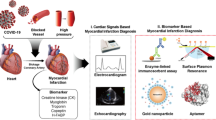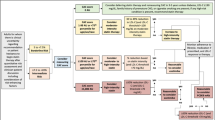Abstract
Coronary heart disease (CHD) is an inflammatory process that takes decades to develop. In HIV-seronegative persons, high-sensitivity C-reactive protein is a biologic marker of CHD risk. HIV infection induces chronic inflammation, despite adequate suppression of HIV replication with antiretroviral therapy, resulting in elevations of several biologic markers associated with CHD risk in HIV-seronegative persons. Indeed, the SMART study demonstrated that interruption in antiretroviral therapy is associated with higher mortality and CHD events postulated to be related to inflammatory mediators such as interleukin-6 and D-dimer. Specific antiretroviral agents (eg, abacavir) have been associated with higher rates of myocardial infarctions and elevations in markers of inflammation such as interleukin-6 and D-dimer in persons with CHD events. This article reviews the current understanding of biomarkers of inflammation associated with the development of CHD in the setting of HIV infection and the use of antiretroviral therapy.
Similar content being viewed by others
References
Papers of particular interest, published recently, have been highlighted as: • Of importance •• Of major importance
•• Libby P, Ridker PM, Hansson GK: Inflammation in atherosclerosis. J Am Coll Cardiol 2009, 54: 2129–38. Excellent recent review of our current understanding of the role of innate and adaptive immunity in the development and progression of atherosclerosis.
Hansson GK: Inflammation, atherosclerosis and coronary artery disease. N Engl J Med 2005;352:1685–95.
•• Ridker PM, Danielson E, Fonseca FAH, et al.: for the JUPITER Study Group. Rosuvastatin to prevent vascular events in men and women with elevated C-reactive protein. N Engl J Med 2008, 359:2195–207. Landmark randomized controlled trial demonstrating that rosuvastatin lowered vascular events by 44% in persons with an LDL < 130 and an hsCRP > 2.0 mg/L.
Serruys PW, Garcia-Garcia HM, Buszman P, et al.: Effects of the direct lipoprotein-associated phospholipase A(2) inhibitor darapladib on human coronary atherosclerotic plaque. Circulation 2008;118:1172–82.
Ridker PM, Morrow DA, Rose LM, et al.: Relative efficacy of atorvastatin 80 mg and pravastatin 40 mg in achieving the dual goals of low-density lipoprotein cholesterol <70 mg/dl and C-reactive protein <2 mg/l: an analysis of the PROVE-IT TIMI-22 trial. J Am Coll Cardiol 2005, 45:1644–8.
Morrow DA, Wang Y, Croce K, et al.: Myeloid-related protein 8/14 and the risk of cardiovascular death or myocardial infarction after an acute coronary syndrome in the Pravastatin or Atorvastatin Evaluation and Infection Therapy: Thrombolysis in Myocardial Infarction (PROVE IT-TIMI 22) trial. Am Heart J 2008;155:49-55.
LpPLA(2) Studies Collaboration: Lipoprotein-associated phospholipase A(2) and the risk of coronary disease, stroke and vascular mortality: collaborative analysis of 32 prospective studies. Lancet 2010; 375: 1536–44.
Lowe GD, Rumley A, McMahon AD, et al.: for the West of Scotland Coronary Prevention Group. Interleukin 6, fibrin D-dimer and coagulation factors VII and XIIa in the prediction of coronary heart disease. Arterioscler Thromb Vasc Biol 2004; 24: 1529–34.
Welsh P, Whincup PH, Papacosta O, et al.: Serum matrix metalloproteinase-9 and coronary heart disease: a prospective study in middle-aged men. Q J Med 2008; 101:785–791.
Data Collection on Adverse Events of Anti-HIV Drugs (DAD) Study Group: Combination antiretroviral therapy and the risk of myocardial infarction. N Engl J Med 2003, 349:1993-2003.
Mary-Krause M, Cotte L, Simon A, et al.; and the Clinical Epidemiology Group from the French Hospital Database. Increased risk of myocardial infarction with duration of protease inhibitor therapy in HIV-infected men. AIDS 2003, 17:2479–2486.
Klein D, Hurley L, Queensbury C, Sidney S: Do Protease Inhibitors Do protease inhibitors increase the risk for coronary heart disease in patients with HIV-1 infection? J Acquir Immune Defic Syndr 2002, 30:471–7.
Strategies for Management of Antiretroviral Therapy (SMART) Study Group, El-Sadr WM, Lundgren JD, et al.: CD4+ count-guided interruption of antiretroviral treatment. N Engl J Med 2006, 355:2283–96
Data Collection on Adverse Events of Anti-HIV Drugs (DAD) Study Group: Class of Antiretroviral Drugs and the Risk of Myocardial Infarction. N Engl J Med, 2007; 356: 1723–35.
Worm SG, Sabin C, Weber R, et al.: Risk of Myocardial Infarction in Patients with HIV Infection Exposed to Specific Individual Antiretroviral Drugs from the 3 Major Drug Classes: The Data Collection on Adverse Events of Anti-HIV Drugs (D:A:D) Study. J Infect Dis 2010; 201:318–30.
Bozzette SA, Ake CF, Tam HK, et al.: Long-term survival and serious cardiovascular events in HIV-infected patients treated with highly active antiretroviral therapy. J Acquir Immune Defic Syndr 2008, 47:338―41.
•• D:A:D Study Group: Use of nucleoside reverse transcriptase inhibitors and risk of myocardial infarction in HIV-infected patients enrolled in the D:A:D study: a multi-cohort collaboration. Lancet 2008, 371: 1417-26. Large, prospective, observational study of complications of HIV demonstrating higher risk of myocardial infarction with current use of abacavir or didanosine. Effect disappears 6 months after stopping drugs.
The SMART/INSIGHT and the D:A:D study groups: Use of nucleoside reverse transcriptase inhibitors and risk of myocardial infarction in HIV-infected patients. AIDS. 2008, 22: F17–F24
• Brothers CH, Hernandez JE, Cutrell AG, et al.: Risk of myocardial infarction and abacavir therapy: no increased across 52 GlaxoSmithKline sponsored clinical trials in adult subjects. J Acquir Immune Defic Syndr 2009; 51: 20-8. Analysis of CHD events in randomized trials of abacavir versus placebo showed no clear effect, although the study was limited by only 63 endpoints in more than 14,000 subjects studied.
• Costagliola D, Lang S, Mary-Krauss M, Boccara F: Abacavir and cardiovascular risk: reviewing the evidence. Curr HIV/AIDS Rep 2010, 7: 127–33. Analysis of 10 recent trials demonstrated association or lack of association of abacavir with risk of myocardial infarction. Authors note that there were several confounding variables that could explain associations observed in some studies, including cigarette smoking, renal insufficiency, cocaine use, and/or injection drug abuse.
•• Kuller LH, Tracy R, Belloso W, et al.: for the INSIGHT SMART Group. Inflammatory and Coagulation Biomarkers and Mortality in Patients with HIV Infection. PLoS Medicine 2008, 5; e203: 1496–1508. Nested case-control study of biomarkers showed a relationship between all-cause mortality and baseline IL-6, D-dimer, and hsCRP with the strongest association for the former two.
Calmy A, Gayet-Agerona A, Montecucco F, et al.: HIV increases markers of cardiovascular risk: results from a randomized, treatment interruption trial. AIDS 2009, 23:929–939.
•• Tien PC, Choi AI, Zolopa AR, et al.: Inflammation and Mortality in HIV-Infected Adults: Analysis of the FRAM Study Cohort. J Acquir Immune Defic Syndr 2010; 55:316–322. Cross-sectional study with 5-year follow-up demonstrating that fibrinogen and hsCRP were associated with all-cause mortality in persons with HIV, most of whom were receiving antiretroviral therapy.
Lau B, Sharrett AR, Kingsley LA, et al.: C-Reactive Protein Is a Marker for Human Immunodeficiency Virus Disease Progression. Arch Intern Med. 2006;166:64-70.
Feldman JG, Goldwasser P, Holman S, et al.: C-Reactive Protein Is an Independent Predictor of Mortality in Women With HIV-1 Infection. J Acquire Immun Defic Syndr. 2003, 32:210–214.
•• Kalayjian RC, Machekano RN, Rizk N, et al.: Pretreatment Levels of Soluble Cellular Receptors and Interleukin-6 Are Associated with HIV Disease Progression in Subjects Treated with Highly Active Antiretroviral Therapy. J Infect Dis 2010; 201:1796–1805. Higher pretreatment concentrations of sTNFR-1, sCD27, sCD40L, and plasma IL-6 were associated with a new AIDS-defining illness or death.
Palella FJ, Jr., Gangeb SJ, Benning L, et al.: Inflammatory biomarkers and abacavir use in the Women’s Interagency HIV Study and the Multicenter AIDS Cohort Study. AIDS 2010, 24:1657–1665.
Benson CRH, Zheng E, Smurzynski M, et al.: No association of abacavir use with risk of myocardial infarction or severe cardiovascular disease events: Results from ACTG A5001 [Abstract 721]. 16th Conference on Retroviruses and Opportunistic Infections 8-11 February 2009; Montreal.
Martinez E, Larroussea M, Podzamczer D, et al.: Abacavir-based therapy does not affect biological mechanisms associated with cardiovascular dysfunction. AIDS 2010, 24:F1–F9.
Jong E, Meijers J, van Gorp E, et al.: Markers of inflammation and coagulation indicate a prothrombotic state in HIV-infected patients with long-term use of antiretroviral therapy with or without abacavir. AIDS Research and Therapy 2010, 7;9: 1-7.
Martin A, Amin J, Cooper DA, et al.; on behalf of the STEAL study group. Abacavir does not affect circulating levels of inflammatory or coagulopathic biomarkers in suppressed HIV: a randomized clinical trial. AIDS 2010, Sep 7. [Epub ahead of print]
Hsue PY, Hunt PW, Sinclair E, et al.: Increased carotid intima-media thickness in HIV patients is associated with increased cytomegalovirus-specific T-cell responses. AIDS 2006, 20:2275–2283.
Ross AC, O’Riordan MA, Storer N, et al.: Heightened inflammation is linked to carotid intima-media thickness and endothelial activation in HIV-infected children. Atherosclerosis 2010; 211: 492–498.
van Vonderen M, Hassink E, van Agtmael M, et al.: Increase in Carotid Artery Intima-Media Thickness and Arterial Stiffness but Improvement in Several Markers of Endothelial Function after Initiation of Antiretroviral Therapy. J Infect Dis 2009; 199:1186 –94.
•• Ross AC, Rizk N, O’Riordan MA et al.: Relationship between Inflammatory Markers, Endothelial Activation Markers, and Carotid Intima-Media Thickness in HIV-Infected Patients Receiving Antiretroviral Therapy. Clin Infect Dis 2009; 49:1119–27. Case-control cross-sectional study correlating hsCRP and sVCAM with cIMT in 73 subjects with HIV.
Parra S, Coll B, Aragones G, et al.: Nonconcordance between subclinical atherosclerosis and the calculated Framingham risk score in HIV-infected patients: relationships with serum markers of oxidation and inflammation. HIV Medicine 2010, 11, 225–231.
Disclosure
Conflicts of interest: C. Fichtenbaum—honoraria and expense reimbursement from Abbott, Merck, and Tibotec; speakers’ bureau of American Heart Association; grants (to institution) from Tibotec, Abbott, Pfizer, Salix, and the University of North Carolina.
Author information
Authors and Affiliations
Corresponding author
Rights and permissions
About this article
Cite this article
Fichtenbaum, C.J. Inflammatory Markers Associated with Coronary Heart Disease in Persons with HIV Infection. Curr Infect Dis Rep 13, 94–101 (2011). https://doi.org/10.1007/s11908-010-0153-9
Published:
Issue Date:
DOI: https://doi.org/10.1007/s11908-010-0153-9




